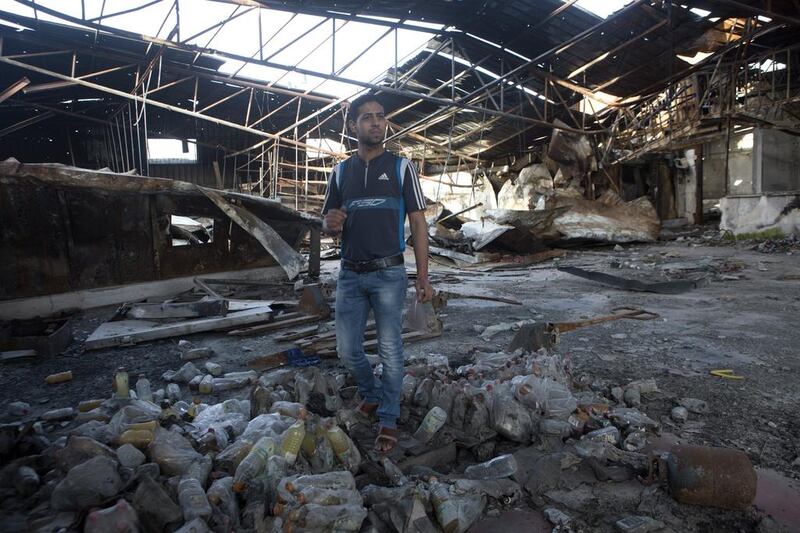Gaza // When Mais Jamal graduated with a business degree, at the age of 21, she dreamt of becoming an “international woman” working in business or banking. But in the two years since leaving Azhar University she has not been able to secure a job.
Instead, she has joined the growing list of unemployed in Gaza, where due to an Israeli blockade and repeated attacks on the territory, the jobless rate is one of the highest in the world.
“During my study I had a lot of training to get experience to be ready for work,” said the 23-year-old from Gaza City. “I really wanted to get a job in a bank or a telecommunications company but here it seems people are not hired on the skills you have – always there is nepotism.”
Forced to go back to training Ms Jamal has enrolled to intern with the United Nations. Like most young people here she wants to work overseas.
Unemployment rates of around 45 per cent jumped by nearly five per cent after Israel’s seven-week war against militants in Gaza last summer destroyed nearly 1,000 factories, business and workplaces, according to the Palestinian labour ministry.
With much of the US$5.4 billion (Dh19.83bn) in pledged aid to rebuild Gaza on hold because of restrictions placed by Israel, there is unlikely to be any improvement in those figures in the near future.
A recent report by the International Labour Organisation found 17,200 jobs were lost in Gaza as a result of the last war, with an estimated loss in GDP of $508,000 per working day since the hostilities ended in August.
The report’s author, Salem Ajluni, said unemployment had been a problem for a long time in Gaza, largely due to Israel’s occupation, a limited resource base and border closures leaving people “isolated, impoverished and vulnerable”.
“Some 67 per cent of workers earned less than the minimum wage, and as wage employment is the principal source of income for the vast majority of Gaza households, it is not surprising that 80 per cent of Gaza residents were dependent on aid and 57 per cent were food insecure” after the war last year, said Mary Kawar, senior employment specialist at the ILO.
The conflict last summer was the latest episode in recent history that has deprived Gazans of their right to work.
Before the intifada which started in 2000, about 120,000 Gazans were employed in Israel, said Khader Shniwra, the manager of the Palestinian Federation of Industries. The ensuing Israeli security crackdown meant that figure had dropped to 500 by 2003. And after Hamas took control of Gaza by force in 2007, Israel stopped allowing Gazans to leave the territory to work and later imposed a blockade.
Unemployment leapt higher after the Israeli war on Gaza in 2008, when 6,500 factories were destroyed.
“In 2006 unemployment was around 28 per cent and it’s just jumped dramatically every few years since,” Mr Shniwra said.
The construction industry in Gaza alone had employed about 350,000 people before 2007. Now, with building materials scarce because of Israel’s blockade, the industry employs just under 200 workers.
Mr Shniwra said the situation improved briefly in 2010 when construction materials were brought through tunnels from Egypt. But those tunnels have since been destroyed, closing off the only supply route.
Nabeel Mabhoud from labour ministry said young graduates and Gazan youth aged between 18 and 25 were the most vulnerable to unemployment.
“Of the 10,000 graduates in Gaza every year only 10 per cent get jobs,” he said.
Mr Mabhoud said there was no defined minimum wage in Gaza but it was commonly thought to be about 40 shekels (Dh38) a day.
Of the 17,200 jobs lost since the war last year, 7,000 were in the industrial sector, which once hired about 30 per cent of the working population, Mr Shniwra said.
In Shujaieh, one of the areas worst hit by the Israeli campaign, one of Gaza’s biggest businesses, Al Wadia and Sons, is a rare bright spot.
Standing inside a warehouse of the dairy producer and food importer that was ripped apart by artillery shells when Israel invaded northern Gaza in July, one of the owners, Mohammed Al Wadia, 23, said they were able to get through the war without laying off any staff.
The warehouse and its contents – dairy products and food items imported from Israel and abroad – were moved to temporary locations.
“Our staff were really motivated, and because we kept them employed they seem really grateful,” said Mr Al Wadia.
The company lost an estimated $1.7 million during the war and, being in Gaza, they were uninsured.
It is now back in business with a new warehouse in the Khani industrial zone that sits metres away from Gaza’s border with Israel. However, it has had to scale back operations because Israeli restrictions have prevented it from bringing in the insulation panels needed for refrigeration units.
“We need about eight more refrigeration units and there’s no justification for the delay. I’ve been writing to Tony Blair at the Office of the Quartet trying to get something done on Israel’s restrictions,” Mr Al Wadia said.
At least his company’s 85 workers, who earn a minimum of 1,300 shekels a month, are able to support their families amidst the devastation in Gaza.
foreign.desk@thenational.ae





